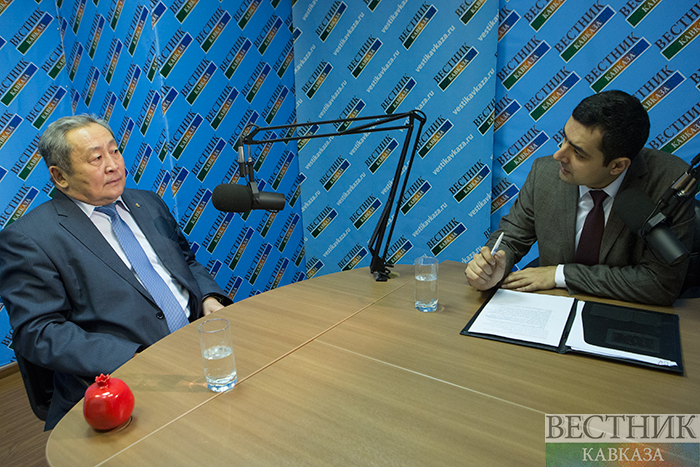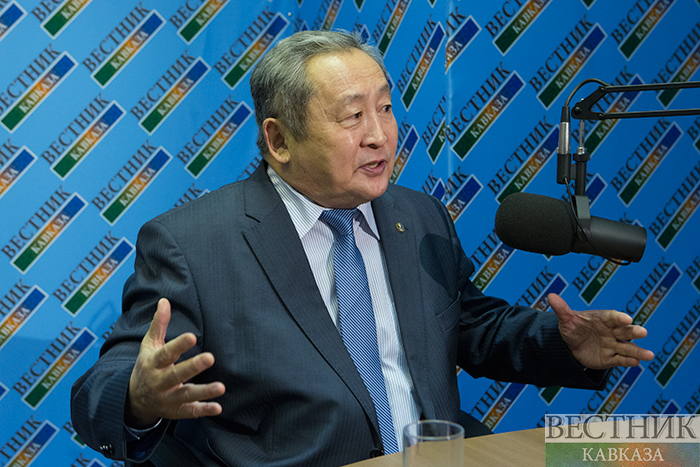Tribune’s guest is a member of the Federation Council Committee on International Affairs, the senator from Buryatia, Honored Worker of Science, Doctor of Geographical Sciences, professor, corresponding member of the Russian Academy of Sciences, and, if I'm not mistaken, the author of hundreds of scientific works, Arnold Tulokhonov.
- Buryatia is situated in the hazard area of forest fires. You raised the issue of forest fires at the last plenary session of the Federation Council. To what extent is the situation critical now, in winter? How many forest fires occur?
- The problem of forest fires has become very important for Russia. Last year, for the first time 1 million hectares were burning. The cause of these fires is not just dry weather or firefighters' insufficient work, but a lot of social problems. In the winter, when the temperature is 40 C below zero, a fire can be so large that you cannot see in any direction on the Moscow-Vladivostok highway. There is the only regional law in the Russian federal legislation – the law on the protection of Lake Baikal. And it is so extreme in terms of solving ecological problems, as if there are no people. The government's directives provide for a so-called water protection zone, which actually restricts a man's constitutional right to natural resources. You cannot build or expand something, bury people, lay roads, cut burned forest. A human being is weaned from his native land. The locals say, "we have no rights to the forest, land or even to be buried. Then use your federal agencies to extinguish these fires." Last year, a mandatory environmental assessment was introduced on the territory from Chita to Irkutsk, which twofold and threefold reduced new construction. If a district needs to build a school, it must carry out an environmental assessment first, which costs a lot of money. People do not have the right to privatize the land around Baikal. There are a lot of such incidents, which negatively affect a person's life. I was approached by 11 thousand local residents, who asked: "Why do we need a law which turns against us?" And these are the social consequences of these crude laws, which are accepted inside the Garden Ring and not even relevant to the territory towards which they are directed.

- Are some domestic human needs not always roughly the same as those laws that are in force?
- There are laws that address social and economic problems. But laws are created by lawyers, jurists who don’t know the basics of the natural ecosystems. If life begins to regulate the laws of nature, it meets resistance both from nature and from the locals. There are different laws in nature, they never obey our wishes. We should correct laws if they are isolated from the foundations of existence. Why is it forbidden to bury a person on the shore of Lake Baikal, to build a road, to cut wood, to catch fish? Then what should people do? It is a violation of constitutional rights.
I wrote a letter to the Attorney General; but, unfortunately, we have laws that are easily bypassed by all sorts of formal replies. So I did not get a real answer. The Constitution has framework laws that are written pretty well, but they need specific laws. Why are the reforms in the country not successful? They are developed for a huge country. Here, the reform of agriculture – how can there be the same conditions for Krasnodar and Yakutia? Even Nikita Khrushchev, when he was dreaming of communism, writing a program for 20 years, wrote the conditions under which it should be achieved. There were figures, a basis, a scientific approach. Khrushchev realized that the development of Siberia and the Far East was impossible without science. He created the world's largest Akademcity in Novosibirsk. He was not a very competent person, but he really understood the situation. Joliot-Curie said that a country that does not develop science inevitably turns into a colony. It is necessary to know the basics and consider a scientific approach to develop our legislation. Why doesn't the program of development of the Far East work? There is a list of activities that address regional problems, and the governors of each of them are fighting for budget money. There are no interests of Russia. This is the biggest drawback of our economic plans.

- 2017 was declared as the year of specially preserved areas. Lake Baikal is a specially preserved area indeed. About 20% of the fresh water reserves of the planet (i.e. Lake Baikal contains more water than the five Great Lakes together on the North American continent) is Lake Baikal. Previously, the main problem of Lake Baikal was a cellulose factory. It was shut down a few years ago. Could you tell me what the environmental condition of the lake is now and what problems still exist?
- Baikal is included on the list of World Natural Heritage sites. Russia, together with the world international community, took responsibility for Lake Baikal by signing the corresponding convention. Baikal is not the property of Buryatia, the Irkutsk Oblast or Russia. It is the pride of the world, part of world heritage. Accordingly, we should stick to these positions. The whole world should solve these problems, instead of local residents. Despite the number of fires, the government decided to reduce funding fourfold, the forest service by half. How can we fight fires under such circumstances, when only 20% of the necessary sum is allocated? And they say that Buryatia is responsible for forest fires! The government should correct the situation.
To be continued






